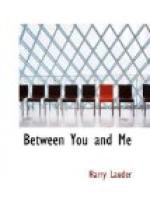“Eh!” they’ll say. “So there’s Harry Lauder coming, is there? And he’s the funniest wee man in the halls, is he? He’d make a graven image laugh, would he? Well, I’ll be seeing! Maybe he can make me laugh— maybe no. We’ll just be seeing.”
That’s human nature. It’s natural for people to want to form their own judgments aboot everything. And it’s natural, tae, for them tae be almost prejudiced against anyone aboot whom sae much has been said. I realized a’ that; I’d ha’ felt the same way myself. It meant a great deal, too, the way I went in New York. If I succeeded there I was sure to do well i’ the rest of America. But to fail in New York, to lose the stamp of a Broadway approval—that wad be laying too great a handicap altogether upon the rest of my tour.
In London I’d had nothing to lose. Gi’e’n I hadna made my hit that first nicht in the Westminster Bridge Road, no one would have known the difference. But in New York there’d be everyone waiting. The critics would all be there—not just men who write up the music halls, but the regular critics, that attend first nichts at the theatre. It was a different and a mair serious business than anything I’d known in London.
It was a great theatre in which I appeared—one o’ the biggest in New York, and the greatest I’d ever played in, I think, up tae that time. And when the nicht came for my first show the hoose was crowded; there was not a seat to be had, e’en frae the speculators.
Weel, there’s ane thing I’ve learned in my time on the stage. You canna treat an audience in any verra special way, just because you’re anxious that it shall like you. You maun just do your best, as you’ve been used to doing it. I had this much in my favor—I was singing auld songs, that I knew weel the way of. And then, tae, many of that audience knew me. There were a gude few Scots amang it; there were American friends I’d made on the other side, when they’d been visiting. And there was another thing I’d no gi’en a thocht, and that was the way sae many o’ them knew ma songs frae havin’ heard them on the gramaphone.
It wasna till after I’d been in America that I made sae many records, but I’d made enough at lime for some of my songs tae become popular, and so it wasna quite sicca novelty as I’d thought it micht be for them to hear me. Oh, aye, what wi’ one thing and another it would have been my ain fault had that audience no liked hearing me sing that nicht.
But I was fairly overwhelmed by what happened when I’d finished my first song. The house rose and roared at me. I’d never seen sic a demonstration. I’d had applause in my time, but nothing like that. They laughed frae the moment I first waggled my kilt at them, before I did more than laugh as I came oot to walk aroond. But there were cheers when I’d done; it was nae just clapping of the hands they gie’d me. It brought the tears to my een to hear them. And I knew then that I’d made a whole new countryful of friends that nicht—for after that I couldna hae doots aboot the way they’d be receiving me elsewhere.




